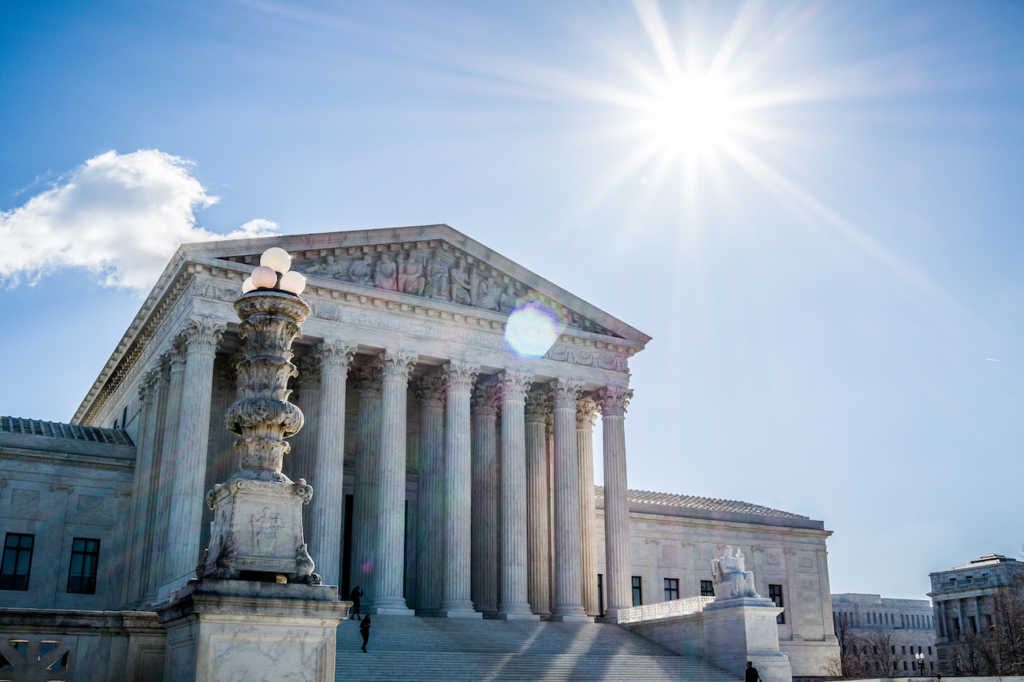Conservative thinkers and political prognosticators have already started forecasting who President Donald Trump could choose to replace Supreme Court Justice Anthony Kennedy, who announced his retirement Wednesday.
Ever since the presidential election, conservatives and Christians alike have been angling for a shot at overturning Roe v. Wade, the landmark 1973 decision that ensured abortion access across the country. In fact, those who voted for Trump have long said the opportunity to shape the Supreme Court for the next generation was the sole reason they cast their ballot for the brash billionaire in 2016.
How SCOTUS Sending Florist Case Back to State Court Could be a Victory for Religious Liberty
With Kennedy on his way out, Trump will now have the chance to pick his second Supreme Court nominee, and he’s said his selection will come from a list the White House published in 2017, when the president nominated Justice Neil Gorsuch to fill the late Justice Antonin Scalia’s seat.
Following the stunning news, conservative writer Dan McLaughlin wrote, “We have never had a pro-life female Justice, though there are millions of pro-life women in America.”
He’s right. Here are three women — all of whom are on Trump’s short list — conservative commentator and writer Guy Benson suggested Trump could nominate to the high court:
Allison Eid
Allison Eid, 53, was confirmed last November to the 10th Circuit Court of Appeals, filling the vacancy left by now-Supreme Court Justice Neil Gorsuch. The 10th Circuit has jurisdiction in the six states of Oklahoma, Kansas, New Mexico, Colorado, Wyoming, and Utah, as well as portions of Idaho and Montana.
Eid was approved by the U.S. Senate with a 56-41 vote. Four Democratic senators — Michael Bennet (D-Colo.), Joe Donnelly (D-Ind.), Heidi Heitkamp (D-N.D.), and Joe Manchin (D-W.V.) — stepped across the aisle to support the Trump nominee.

When it comes to the issue of abortion, Eid served as a clerk for the pro-life Supreme Court Justice Clarence Thomas from 1993 until 1994. And in 2013, she voted to hear the appeal of an injunction against public displays of graphic abortion images, which were deemed “gruesome.”
Despite her efforts to hear the case, the Colorado Court of Appeals ultimately voted not to take up the matter.
Joan Larsen
Joan Larsen, 49, was confirmed last November to the 6th Circuit Court of Appeals, which has jurisdiction over the four states of Kentucky, Michigan, Ohio, and Tennessee.
Larsen was approved by the U.S. Senate with a 60-38 vote with eight Democrats joining the Republicans to support her appointment to the 6th Circuit. From 1994 until 1995, Larsen clerked for the late Supreme Court Justice Antonin Scalia, who over the years voted in favor of numerous pro-life cases as well as religious liberty cases.

When asked what it was like to clerk for Scalia as a woman, Larsen wrote in 2016 that she often replies, “Much like being a man clerking for him.”
In 2004, Larsen wrote an article explaining why she disagreed with the Supreme Court’s decision to strike down Texas’ sodomy law in the landmark case Lawrence v. Texas. She said it was “an understatement in the extreme” to call the high court’s ruling “revolutionary.”
Larsen said last year she did “not recall” why she took such issue with the ruling, though it appears her complaint about the decision had to do with that fact that the court pointed to international norms as a way to justify the consequential interpretation of American constitutional law.
She wrote:
Its holding aside, Lawrence may have added a spark to a quieter revolution—a revolution in constitutional interpretation that has been stirring, largely unnoticed, for years. The revolution of which I speak, and to which this paper is devoted, is the Court’s recent, and unexplained, embrace of comparative and international law norms as aids to domestic constitutional interpretation.
The landmark 6-3 decision struck down Texas’ sodomy law, and by extension, invalidated similar laws in 13 other states, thereby rendering same-sex sexual activity officially legal across the United States.
Amy Barrett
Amy Barrett, 46, was confirmed in late October 2017 to the 7th Circuit Court of Appeals, which has jurisdiction in the three states of Illinois, Indiana, and Wisconsin.
The U.S. Senate approved Barrett with a 55-43 vote. Three Democratic senators — Joe Manchin (D-W.V.), Joe Donnelly (D-Ind.), and Tim Kaine (D-Va.) — crossed party lines to vote in favor of the Trump nominee.

Barrett is perhaps the most well-known of these three women, given she faced intense questioning from Sen. Dick Durbin (D-Ill.) and Sen. Dianne Feinstein (D-Calif.) over her Catholic faith. In one particularly noteworthy exchange, Feinstein seemingly suggested her religious beliefs could disqualify Barrett from serving on the bench.
“When you read your speeches,” Feinstein lectured, “the conclusion one draws is that the dogma lives loudly within you. And that’s of concern when you come to big issues that large numbers of people have fought for for years in this country.”
Then Durbin seemed to outrightly apply a religious test to Barrett, asking her, “Do you consider yourself an orthodox Catholic?”
Over the years, Barrett’s writing has indicated she does not believe Roe v. Wade falls under the umbrella of super-precedent, meaning the landmark decision can, in her view, be revisited and perhaps reframed or even overturned.
Concerns Arise Over Increasing ‘Intolerance’ After Multiple Trump Nominees Grilled Over Faith
Barrett also signed onto a 2012 letter taking issue with the contraceptive mandate in then-President Barack Obama’s Affordable Care Act. The letter described the health care mandate as “a grave violation of religious freedom and cannot stand.”
“The simple fact is that the Obama administration is compelling religious people and institutions who are employers to purchase a health-insurance contract that provides abortion-inducing drugs, contraception and sterilization,” it read.
Conservative and Christian thought leaders alike rejoiced Wednesday after hearing news of Kennedy’s retirement. The 82-year-old justice said he will officially step down from his post on July 31.



